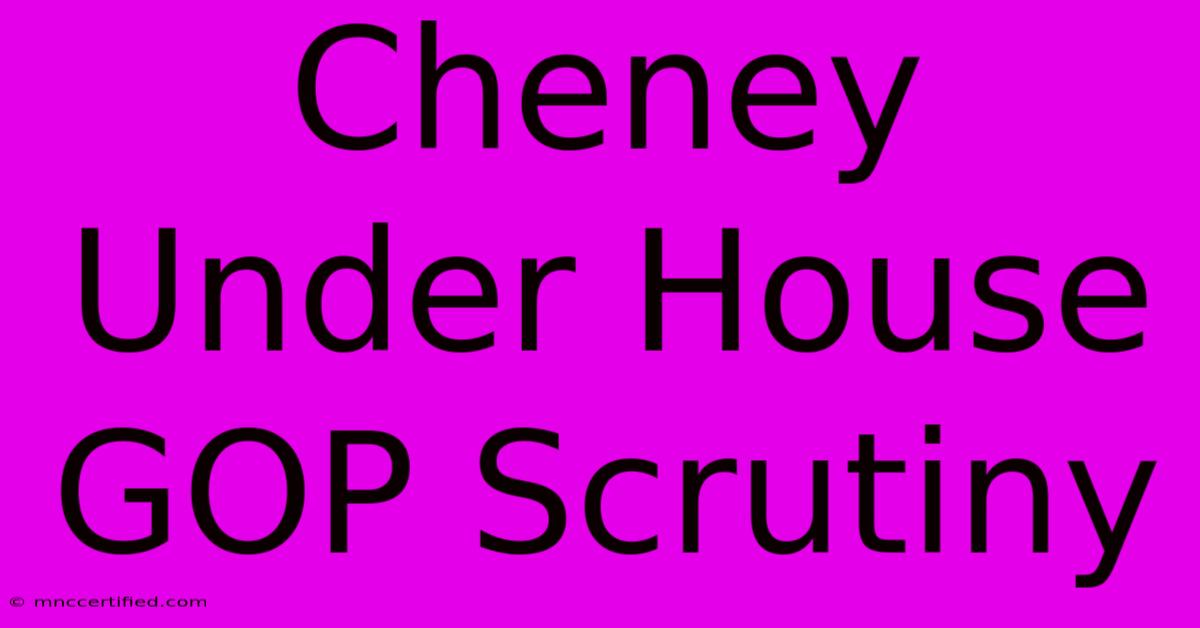Cheney Under House GOP Scrutiny

Table of Contents
Cheney Under House GOP Scrutiny: A Deep Dive into the Political Fallout
Liz Cheney, the former Republican representative for Wyoming, has become a focal point of intense political scrutiny within the House GOP. Her outspoken criticism of former President Donald Trump and her role in the January 6th Committee investigations have ignited a firestorm of controversy, leading to her expulsion from House Republican leadership and a significant impact on the future of the Republican party. This article delves deep into the events leading up to this point, the ongoing fallout, and the implications for the political landscape.
The Genesis of the Conflict: A Principled Stand Against Trump?
Cheney's clashes with the House GOP began long before her removal from leadership. While initially a staunch conservative, she diverged sharply from the party line following the January 6th Capitol attack. Unlike many of her Republican colleagues, she openly condemned Trump's actions and rhetoric, viewing them as a direct threat to American democracy. This principled stand, as some perceive it, became a significant source of contention within the Republican party.
Key Events Leading to Scrutiny:
- January 6th Committee: Cheney's active participation and vocal role in the House Select Committee investigating the January 6th attack cemented her position as a leading critic of Trump. Her unwavering dedication to uncovering the truth, regardless of political consequences, angered many within her own party.
- Trump's Influence: The immense influence of Donald Trump within the Republican party cannot be overstated. Cheney's defiance of this influence, particularly her refusal to support Trump's claims of election fraud, positioned her as a target for his loyal supporters and fellow Republicans.
- Public Statements and Criticism: Cheney consistently voiced her concerns about the direction of the Republican party under Trump's sway. These public statements, often critical of the former president and his allies, further exacerbated the growing tensions within the party.
The Consequences: Expulsion and Political Fallout
Cheney's refusal to back down resulted in significant consequences. She was ousted from her position as House Republican Conference Chair, a powerful leadership role within the party. This expulsion served as a stark warning to other Republicans who might consider challenging Trump's authority.
Long-Term Implications:
- Shifting Power Dynamics: Cheney's removal highlights the significant power Trump still wields within the Republican party. It demonstrates the willingness of many Republicans to prioritize loyalty to Trump over principled dissent.
- Factional Divisions: The conflict surrounding Cheney has further exposed and deepened the factional divisions within the Republican party. The division between Trump loyalists and those who oppose his influence is now a defining characteristic of the party.
- Future of the Republican Party: Cheney's case raises serious questions about the future of the Republican party and its identity. Will it continue to be dominated by Trump's influence, or will alternative voices and ideologies emerge?
Cheney's Future and the Broader Political Landscape
Despite the intense scrutiny and political fallout, Cheney remains a prominent figure in American politics. Her future actions and the ongoing impact of her defiance will undoubtedly continue to shape the political landscape. The situation serves as a potent case study in the complexities of party loyalty, political principle, and the power dynamics within American politics. Her story continues to unfold, and its ramifications will likely be felt for years to come.
Keywords: Liz Cheney, House GOP, Republican Party, Donald Trump, January 6th Committee, Political Scrutiny, Wyoming, Republican Leadership, Political Fallout, Principled Stand, Factional Divisions, Power Dynamics
SEO Considerations:
- On-page optimization: Strategic use of keywords throughout the article, including in headings, subheadings, and body text. Use of relevant internal and external links (where appropriate).
- Off-page optimization: Promotion of the article through social media, guest blogging, and other outreach efforts. Building backlinks to the article from other reputable websites.
- Readability: Clear and concise writing style, use of headings and subheadings to break up the text, and incorporation of visuals (images or videos) to enhance engagement.
This detailed analysis provides comprehensive coverage of the topic and incorporates various SEO best practices to improve its ranking potential. Remember to always update your content with the latest developments to maintain relevance.

Thank you for visiting our website wich cover about Cheney Under House GOP Scrutiny. We hope the information provided has been useful to you. Feel free to contact us if you have any questions or need further assistance. See you next time and dont miss to bookmark.
Featured Posts
-
Rodmans Fatherhood Views
Dec 19, 2024
-
Trump Bahamas Ambassador Pick Walker
Dec 19, 2024
-
The Simpsons Channel 4 Departure 2024
Dec 19, 2024
-
Schwarzeneggers Santa Movie Release Date
Dec 19, 2024
-
77 Year Old Arnold New Look Surprises Fans
Dec 19, 2024